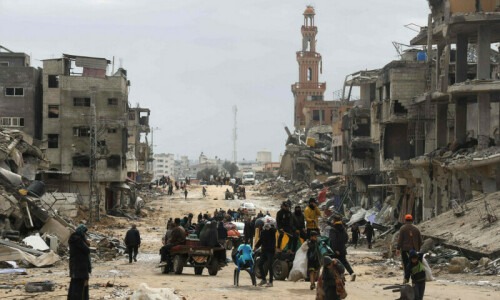CAIRO: Amidst continuing talks on a ceasefire agreement in Gaza that mediators want to finalize before Ramadan early next week, Hamas said on Thursday that its team has left Cairo.
There has been no evidence of progress on major issues after four days of negotiations facilitated by Qatar and Egypt to establish a 40-day ceasefire ahead of the fasting month, with both sides placing blame on one another.
An official statement from Hamas stated, “Hamas’s delegation left Cairo this morning for consultation with the movement’s leadership, with negotiations and efforts continuing to stop the aggression, return the displaced, and bring in relief aid to our people.”
According to senior Hamas official Sami Abu Zuhri, Israel has been “thwarting” attempts to reach a ceasefire agreement. According to him, Israel is refusing Hamas’s requests to stop its offensive within the enclave, remove its forces, and guarantee freedom of entry for humanitarian aid and the repatriation of displaced individuals.
According to Gaza’s health officials, the official death toll from Israel’s offensive has surpassed 30,800. The Israeli bombing in Khan Younis, Rafah, in the south, and parts of central Gaza, according to witnesses, continued, and there had been eighty-three deaths in the previous twenty-four hours.
Hopelessness
According to Hamas authorities, a ceasefire is necessary before Israeli forces evacuate Gaza, the prisoners can be released, and all Gazans may go back to the houses they have fled.
Given that the detainees are dispersed around the combat zone, Hamas has stated that it is unable to furnish a list of those who are still alive without a ceasefire. With five months of fighting under its belt and a severe humanitarian catastrophe, Gaza was in profound despair when word spread that the Hamas delegation had left Cairo without reaching a deal.
“I feel great disappointment and despair, fear too,” Abir said. She and her 12-member family have fled to Rafah in the southern Gaza Strip, where over half of the 2.3 million residents of the enclave are currently seeking safety.
Through a chat app, Abir stated, “America must apply pressure for an end to the war or a long-term truce and allow in lots of aid to all residents.” Together, the US Central Command and the Royal Jordanian Air Force persisted on Thursday in their efforts to transport food and other supplies to the enclave’s northern region, where a significant section of the populace, according to UN agencies, is in danger of starvation.
mass grave
According to Hamas officials, Israel returned 47 Palestinians’ bodies that it had slain earlier in its offensive via the crossing into the southern Gaza territory on Thursday.
Cut off. Photos revealed a shallow mass grave with remains in blue bags ready for burial.
Working in the morgue of the Abu Yousef Al-Najjar hospital, Ayman Abu Hatab stated, “They bring them to us, the martyrs (are) just numbered — it is not known who they are, and that is all.”
To put more pressure on Israel to “agree to demands for a ceasefire,” Hamas repeated in a separate statement on Thursday the appeal for Palestinians living in the West Bank, Jerusalem, and inside Israel to increase the number of times they visit the Al-Aqsa Mosque during Ramadan.
In part because of worries that the Jerusalem mosque complex could become a hotbed of violence during the month of Ramadan, negotiators are working to reach an agreement before the start of Ramadan.
Without giving specific numbers, Israel has stated that it will permit a comparable degree of access to the location as in prior years.








